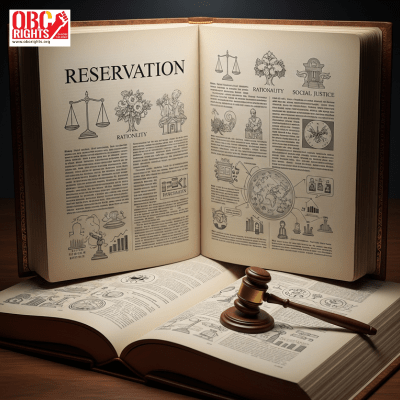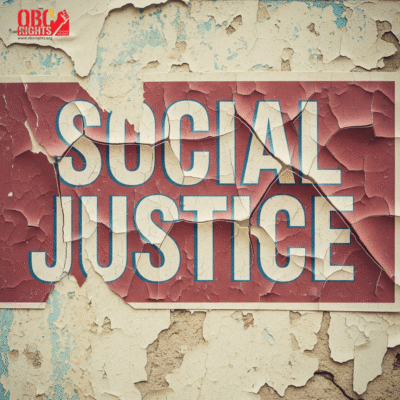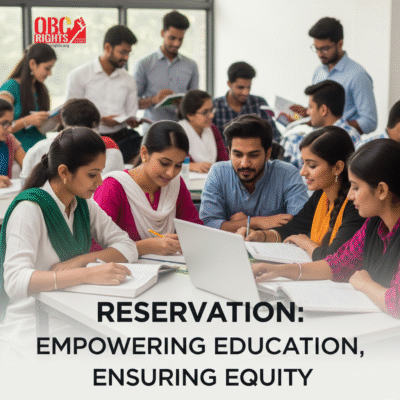Introduction
In today’s India, the reservation subject has become the hottest one. What was once designed as a powerful tool for social justice has now become a subject of confusion, conflict, and controversy. As new communities demand inclusion and long-time beneficiaries feel overlooked. The question that often arises – Is the reservation system still fair and effective? .
Originally built on the ideals of equality in education and representation in government and public services, the reservation policy now stands at a crossroads, caught between political pressures, privilege, and neglected voices. To truly understand the logic and fairness of reservation in India, we must step away from cursory observations and look at its deeper roots, both legal and moral.
What is a Reservation?
Reservation in India refers to the policy of setting aside a certain percentage of seats in education, government jobs, and legislatures for historically marginalized and disadvantaged communities such as Scheduled Castes (SC), Scheduled Tribes (ST), Other Backward Classes (OBC), and individuals from Economically Weaker Sections (EWS).
Purpose of Reservation
Reservation is a tool of social justice designed to uplift and empower communities that have been historically oppressed, excluded, or disadvantaged, especially due to caste, profession, class, or economic background. Its core purposes are:
- To uplift historically disadvantaged communities
- To ensure equal access to education, employment, and participation in governance.
- To correct centuries of caste-based discrimination
- To promote inclusive development

The Legal Foundation of the Reservation
The Constitution of India offers a strong legal foundation for implementing reservation policies. A reservation is not a gift or charity given by the government. It is a right promised by the Indian Constitution. While drafting the Constitution, visionary leaders such as Dr. B.R. Ambedkar understood that just giving equal rights in law was not enough, because many people, especially from lower castes and backward communities, are still treated unfairly in real life. Unless or otherwise the government takes or provides measures to uplift those unequals to raise them to the level of advantageous sections/castes, there cannot be.
That’s why the Constitution includes special laws (called Articles) to protect and support these communities.
Important Constitutional Articles on Reservation:
Article 15(4) & 15(5):
These allow the government to make special provisions for the advancement of socially and educationally backward people, especially in colleges and schools.
Article 16(4):
This lets the government reserve jobs in the public sector (government jobs) for backward classes who don’t have fair access.
Article 340:
This Constitutional provision is to investigate/ascertain the conditions of socially and Educationally Backward Classes (OBCs) and make recommendations for the advancement of OBC Communities.
The Supreme Court of India plays an important role in making sure that reservation laws are used fairly and follow the Constitution. Whenever there is confusion or disagreement about how a reservation should be applied, the court steps in to explain and guide.
One very important case was Indra Sawhney vs. Union of India (1992). In this case, the court said:
- Reservations are necessary to help backward communities get fair opportunities.
- But to keep things balanced, total reservations should not go over 50%—except in special cases.
Rationality of Reservation – What It Means
Contrary to popular belief, reservation is not about giving an unfair advantage. It is a corrective step to fix deep-rooted structural imbalances in our society.
Why Reservation Still Matters:
- Addressing Historic Injustice
For centuries, many communities were denied access to education, jobs, and dignity. Reservation is a way to address and correct this longstanding injustice. - Providing Equal Starting Points
While laws may say everyone is equal, the reality is that the citizens have not been provided with equal opportunities, resources, etc. Hence, to bridge the gap, to make unequals become equals ‘Reservation Policy’ came in. - Ensuring Representation
Without reservation, many communities were deprived of opportunities to get admissions / higher education and were not given representation in Public and Government appointments. - Fighting Poverty Through Access
Reservation gives access to better education and jobs, which can lift the underprivileged or neglected communities to come up. - Inclusive National Progress
No nation can progress unless all its people get an integrated or holistic development. Reservation supports the idea of inclusive development and shared success.
Conclusion
Reservation is not a crutch; it’s a corrective tool. It doesn’t aim to bring anyone down; instead, it lifts those who’ve been historically held back. If we want a fair and strong India, we need to ensure everyone gets equal access, not just equal rules.
It’s time to see reservation not as a political tool or social burden, but as a pathway to justice, dignity, and equality—one that’s not perfect, but still very much necessary.
If we really aim for an integrated development, equality, and to end discrimination, implementing reservations in the true spirit of the Indian Constitution is important.



